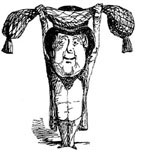
Contraception vs. Natural Piety
GUEST COLUMN
When the Twelve Southerners wrote I’ll Take My Stand, the 1930 agrarian cri de coeur, one of their primary complaints about the industrial civilization of the North was that it was reorienting man’s relationship to nature in a radical and unsettling way. Richard Weaver joined this small chorus years later, protesting what he saw as “a warfare between man and nature, a fanatical warfare, in which…we seek the total overthrow of an opponent.” But — as he pointed out — nature is not an opponent; nature is “the matrix of our being.” A proper outlook on the world, he explained, understands that “beyond a certain point victories over nature are pyrrhic.”
What would it mean to see nature as the matrix of our being? It would mean respect for her design, affection for her beauty, awe at her mystery, and acknowledgment of our ties to her. If these sound old-fashioned it may be because the concept they represent, though genuine, is ancient. It is an old knowledge, now lost, that we need to relearn. We hear things vaguely like this in the pro-nature slogans of environmentalism, but that movement in its radical manifestations is reactionary rather than restorative: Eco-Jacobins proclaim a Gaian revolution, declaring nature to be a kind of goddess, man a kind of animal, and Western culture a kind of error.
The knowledge we need to recover is different. It sees nature as God’s creation and sees man, made in God’s image, as the summit — and the steward — of that creation. This knowledge is ours by birthright, but so forgotten is it that in English there is really no word for it. The best approximation may be the old Latin word pietas, with its connotations of natural piety, filial respect, dutifulness, responsibility, and reverence. The concept is older than Rome, of course. As Dietrich von Hildebrand remarked, “Reverence is a constitutive element of the capacity to ‘wonder,’ which Plato and Aristotle claimed to be the indispensable condition for philosophy.”
When did we stop regarding nature with that mixture of wonder and dutifulness? About four hundred years ago Francis Bacon began trying to persuade us to a different attitude. Rejecting supposedly sterile metaphysical speculation and embracing empirical observation, he sought in the physical sciences a kind of terrestrial salvation. The flight from pietas gained special impetus when the discoveries of Newton in the 17th century apparently dissolved what had seemed nature’s mysteries. The new scientific knowledge, morally neutral in itself, suggested to human ambition the possibility that man, having reduced the universe to the regularity of mathematical formulas, could begin to mold nature according to his desires. (Voltaire, leader of the rationalist attack on Christianity in the 18th century, called Newton the greatest man who ever lived.)
You May Also Enjoy
Old couples in Japan, with no one to depend on, live in makeshift houses offered by the government. They are victims of the contraception-abortion mentality.
If you don’t want children— contracept. If you don’t want children but you get pregnant— abort. If you do want children but can’t conceive— take fertility drugs.
“I didn’t know Christians would help me,” the expectant mother told the counselor. “I thought they were all mean.”

